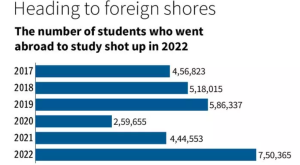- Loans: Loans provide funding for your education but require repayment after graduation. They can be from government agencies, banks, or educational institutions. Interest rates and repayment terms vary, so carefully compare options before choosing.
- Grants: Grants are another crucial source of funding. Unlike loans, grants don’t need to be repaid. They often come from government agencies, educational institutions, or non-profit organizations. Eligibility criteria for grants can vary, so research thoroughly to see which options fit your profile.
- Scholarships: Scholarships are financial awards given for academic merit or other achievements. They are often merit-based or need-based. Your academic performance and other achievements are often taken into consideration when applying for scholarships.
- Work-Study Programs: Many universities offer work-study programs that allow international students to earn money while studying. These programs provide financial support and valuable work experience. These opportunities vary depending on the university and the specific program.
Exploring All Funding Opportunities
It’s essential to explore all potential funding opportunities. Don’t limit yourself to just one or two options. Research government-sponsored programs, university-provided financial aid, and private scholarships. Reach out to international student advisors at your chosen university for guidance. Networking with other international students can also lead to valuable insights and resources.
Comparison of Financial Aid Options
| Financial Aid Option | Description | Conditions |
|---|---|---|
| Loans | Funds borrowed for education, requiring repayment. | Eligibility criteria, interest rates, and repayment terms vary. |
| Grants | Funding awarded for education, not requiring repayment. | Specific eligibility criteria based on need or merit. |
| Scholarships | Financial awards based on academic achievement or other criteria. | Varying requirements depending on the scholarship provider. |
| Work-Study Programs | Opportunities to earn money while studying. | Specific eligibility requirements and availability vary by institution. |
Tips for Success
Naah, dapetin beasiswa internasional tuh ga cuma modal doa aja, gengs! Butuh strategi jitu biar aplikasi lo dilirik. Kita bahas tips ampuh biar peluang lo makin gede, yuk!Getting your hands on an international scholarship is no walk in the park. It takes meticulous planning, a sharp eye for detail, and a dash of hustle. This section dives into strategies for crafting winning scholarship applications, building a strong personal brand, and networking like a pro.
Let’s level up your game!
Tailoring Applications to Specific Scholarships
Understanding the specific requirements and criteria of each scholarship is key to maximizing your chances. Each scholarship has its own unique focus, so tailoring your application to align with that focus is crucial. Research the scholarship’s mission, values, and desired outcomes. Highlight experiences and achievements that directly relate to the scholarship’s objectives. This demonstrates a genuine interest and understanding of the scholarship’s purpose.
A well-tailored application shows you’re not just applying for any scholarship; you’re actively seeking an opportunity aligned with your aspirations.
Building a Strong Personal Brand
Creating a compelling personal brand involves showcasing your unique qualities, experiences, and aspirations. This goes beyond just listing your accomplishments; it’s about weaving a narrative that resonates with scholarship committees. Highlight your passions, skills, and contributions to your community. Showcase your leadership qualities, volunteer work, and involvement in extracurricular activities. Use your personal statement as a chance to paint a vivid picture of yourself, your motivations, and your potential.
Remember, a strong personal brand makes you stand out from the crowd and leave a lasting impression.
Networking with Universities and Organizations
Building connections with universities and organizations can be a game-changer. Reaching out to professors, alumni, and relevant professionals in your field can provide valuable insights, recommendations, and potential mentorship opportunities. Attend webinars, workshops, and university events to connect with potential mentors and advisors. Networking isn’t just about collecting contacts; it’s about forging genuine relationships. Building connections can lead to invaluable support, guidance, and opportunities.



